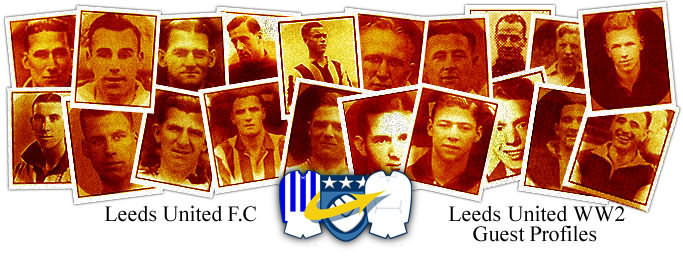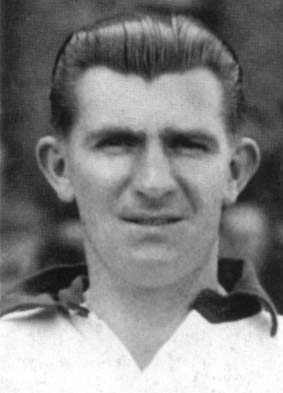

Jones: William Henry (Bill)
WW2 Guest: 1942-1943
(Leeds United War-time Guest Player Details)
Full Back
Born: Whaley Bridge, Derbyshire: 13-05-1921
Debut: v Bradford Park Avenue (h): 13-02-1943
Height & Weight: Unknown
Jones joined Liverpool from Derbyshire club Hayfield St Matthew's in September 1938 at
the age of seventeen. He was not able to make his first team debut before the start of the
Second World War and like many he joined the Army and won a Military Medal in Germany. He
did play some football in the War Years scoring three goals in eventeen games for Liverpool
and also guesting for Leeds United, York City and Reading. He played for Leeds on two
occasions in the 1942-43 Football League Northern Section (Second Championship) the first
being at Right Back in the 1-3 home defeat by Newcastle United and the second on the
following weekend at Left Back in the reverse fixture when this time United triumphed 5-4
at St Jamesí Park. He scored once in five appearances for York City in the 1941-42 season
and he made twenty appearances for Reading in 1942-43 and two more in 1943-44. After the War
Jones went straight into the Liverpool first team and made his debut in the first peacetime
game at the age of twenty-four as the 1946-47 kicked off on 31st August 1946 with Liverpool
winning 1-0 at Bramall Lane against Sheffield United. He quickly scored his first goal for
Liverpool on 7th September 1946 in a 7-4 win over Chelsea at Anfield and he went on to score
twice in twenty-six games as Liverpool won the First Division Championship. He had started
the season at centre-forward. But then his career direction was altered irrevocably by
Liverpool's signing of the prolific marksman Albert Stubbins from Newcastle United. To
accommodate the illustrious newcomer, initially manager George Kay shifted Jones to
inside-left, but he then lost his place in the team, bur regained his place midway through
the season, first at left-half, then at left-back, centre-half and right-half, so that when
the championship crown was finally claimed, he had appeared in six different positions. At
the end of that first post-war season Jones had helped Liverpool become the Division One
Champions for the first time in twenty-four years, marginally edging out Manchester United
and Wolverhampton Wanderers, who both finished on fifty-six points, by a single point. The
title went right down to the last day of the season with Liverpool trailing Wolves by one
point. Liverpool had to travel to Molineux for a final day showdown. Wolves went into the
match, at Molineux on the 31 May 1947, as they had already beaten Liverpool 5-1 at Anfield.
To Wolves' surprise, Liverpool came away with a 2-1 win with the goals coming from Jack
Balmer and Albert Stubbins. Jones played a major role in the game and for the following
seven seasons Jones become an integral member of the side, being able to play in several
different positions, and excelling in each. His next team honour came in the 1949-50 season
when Liverpool were beaten 0-2 in the F.A. Cup Final at Wembley by Arsenal, who had beaten
Leeds in an epic battle at Highbury to reach the Semi-Finals, and he gained a runnersí up
medal after being preferred to Bob Paisley in the Wembley Final. His first representative
call up came on 20th September 1948, when he played at centre-half for the Football League
in a 5-1 win over the Irish League at Anfield, and then he represented England "B" at
right-back on 18th May 1949 in a 4-0 win over Holland "B" at the Olympic Stadium, Amsterdam.
He received two International Caps for England, at Centre Half, the first coming on 14th May
1950 in a 5-3 victory over Portugal in Lisbon and the second four days later against Belgium
in a 4-1 win in Brussels, as England tried to fill the hole created by Neil Franklin's
Columbian adventure. England's squad for the 1950 World Cup contained twenty-one players. On
9th May 1950, two squads (A and B) of fourteen players each were announced for two separate
tours. Of the twenty-eight names, twelve did not make it to the final World Cup squad.
Unfortunately, Jones did not make the final squad. Liverpool had tasted little success in
the years after the war and as Jonesí Anfield career was drawing to a close they were in
great danger of relegation and this danger became a reality in Jonesí final match for
Liverpool on 24th April 1954 as they went down 3-0 to Blackpool at Bloomfield Road and
finished bottom of the League. In his time at Anfield, Jones had scored seventeen goals in
two hundred and fifty-seven League appearances and played another twenty-one games in the
F.A. Cup. He was a very versatile player and in the 1946-47 Championship season he played
in five different positions ranging from Centre Forward to Full Back, but it was as a
Centre Half he is best remembered. He left to join Ellesmere Port Town as Player/Manager,
but returned to Anfield to work for Liverpool as a scout in the 1960's and 1970's and was
instrumental in the signing of many quality players during this time. They would have
included Roger Hunt and Ian Rush and many others. He was also a fine Cricketer and Golfer
and chose Football as a career over Cricket. "Had Liverpool not rescued me from the
obscurity of a minor Derbyshire club, I should probably have tried to earn a living at
cricket or golf. My leaning was towards the latter, and golf is still my main hobby." His
Grandson Rob Jones played for Liverpool and England. Jones died at the Countess of Chester
Hospital, Bache, Chester, from natural causes on 26th December 2010.